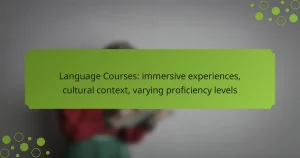
Full degree programs provide essential formal qualifications that significantly enhance career advancement opportunities. By equipping individuals with the necessary knowledge and skills, these programs make graduates more competitive in the job market, catering to a variety of fields and career aspirations.

How can full degree programs enhance career advancement?
Full degree programs significantly enhance career advancement by providing formal qualifications that are often essential for higher-level positions. These programs equip individuals with the knowledge and skills needed to excel in their chosen fields, making them more competitive in the job market.
Increased job opportunities
Completing a full degree program opens up a wider range of job opportunities. Many employers require candidates to hold a degree for positions that offer career growth, especially in fields like healthcare, engineering, and education.
For example, a bachelor’s degree in business can qualify you for management roles that are not accessible to those without formal education. This increased access to job openings can lead to a more fulfilling and stable career path.
Higher earning potential
Individuals with full degrees typically enjoy higher earning potential compared to those without. Studies indicate that degree holders can earn significantly more over their lifetimes, often in the range of 30% to 50% more than their non-degree counterparts.
For instance, in the United States, the average salary for a bachelor’s degree holder can exceed $60,000 annually, while those with only a high school diploma may earn around $35,000. This disparity highlights the financial benefits of pursuing a full degree.
Professional networking opportunities
Full degree programs provide valuable networking opportunities that can facilitate career advancement. Students often connect with peers, professors, and industry professionals, creating a network that can be beneficial for job searches and career growth.
Participating in internships, group projects, and alumni events can further enhance these connections. Building a strong professional network can lead to job referrals and mentorship opportunities, which are crucial for career development.

What types of full degree programs are available online?
Online full degree programs encompass a variety of fields, allowing students to earn qualifications from the comfort of their homes. These programs typically include bachelor’s, master’s, and doctoral degrees across numerous disciplines, catering to diverse career aspirations.
Bachelor’s degrees in business administration
Bachelor’s degrees in business administration are among the most popular online programs, designed to equip students with essential skills in management, finance, and marketing. These programs often require around 120 credit hours and can typically be completed in three to four years, depending on the institution and the student’s pace.
Students can expect to engage in coursework covering topics like organizational behavior, business ethics, and strategic planning. Many programs also offer opportunities for internships or capstone projects, providing practical experience that enhances employability.
Master’s degrees in computer science
Master’s degrees in computer science are increasingly available online, catering to professionals seeking to advance their technical skills and knowledge. These programs usually require a bachelor’s degree in a related field and can take one to two years to complete, depending on the course load.
Core subjects often include algorithms, software development, and data analysis. Many online master’s programs also emphasize hands-on projects and collaboration, allowing students to build a portfolio that showcases their abilities to potential employers.
Doctoral programs in education
Online doctoral programs in education are designed for educators aiming to take on leadership roles or engage in research. These programs typically require a master’s degree and can take three to five years to complete, depending on the research component and dissertation requirements.
Students will delve into advanced topics such as educational policy, curriculum development, and instructional leadership. Many programs also offer a hybrid format, combining online coursework with in-person residencies, allowing for networking and collaboration with peers and faculty.

What are the benefits of pursuing an online full degree program?
Pursuing an online full degree program offers significant advantages, including flexibility, access to a wide range of resources, and cost savings. These benefits can enhance your educational experience and improve your career prospects.
Flexible learning schedules
Online full degree programs provide the flexibility to study at your own pace and on your own schedule. This is especially beneficial for working professionals or those with family commitments, as it allows you to balance education with other responsibilities.
Many programs offer asynchronous courses, meaning you can access lectures and complete assignments whenever it suits you. This flexibility can lead to better time management and reduced stress.
Access to diverse resources
Enrolling in an online full degree program grants you access to a variety of educational resources, including digital libraries, online databases, and interactive learning tools. These resources can enhance your understanding of the subject matter and provide diverse perspectives.
Additionally, many programs facilitate connections with industry professionals and alumni networks, which can be invaluable for mentorship and job opportunities. Engaging with these resources can significantly enrich your learning experience.
Cost-effectiveness
Online full degree programs often come with lower tuition fees compared to traditional on-campus options. This cost-effectiveness can make higher education more accessible, especially for students managing financial constraints.
Moreover, studying online eliminates commuting costs and allows you to save on housing expenses. When considering a program, evaluate the total cost, including materials and fees, to ensure it fits your budget.

What criteria should be considered when selecting an online degree program?
When selecting an online degree program, consider factors such as accreditation, curriculum relevance, and faculty qualifications. These criteria significantly impact the quality of education and the value of the degree in the job market.
Accreditation status
Accreditation is a critical factor in ensuring that an online degree program meets established educational standards. Programs accredited by recognized agencies are more likely to be respected by employers and can affect eligibility for federal financial aid.
Check if the institution is regionally or nationally accredited. Regional accreditation is generally considered more prestigious and may provide better opportunities for credit transfer and further education.
Curriculum relevance
The curriculum should align with current industry trends and employer needs. A relevant curriculum ensures that students acquire the skills and knowledge necessary for their chosen field.
Review course descriptions and learning outcomes to assess whether the program covers essential topics. Look for programs that offer hands-on projects, internships, or practical applications to enhance learning.
Faculty qualifications
Faculty qualifications play a significant role in the quality of education. Instructors with relevant industry experience and advanced degrees can provide valuable insights and mentorship.
Research the faculty’s backgrounds, including their academic credentials and professional experience. Programs with faculty who are active in their fields may offer networking opportunities and real-world perspectives that enrich the learning experience.

How do online full degree programs compare to traditional programs?
Online full degree programs offer flexibility and accessibility that traditional programs may not, allowing students to learn at their own pace and from various locations. However, traditional programs often provide more direct interaction with instructors and peers, which can enhance the educational experience.
Learning environment differences
Online full degree programs typically utilize digital platforms for lectures, assignments, and discussions, enabling students to engage from anywhere with internet access. In contrast, traditional programs usually involve in-person classes, fostering immediate interaction and collaboration among students and faculty.
Students in online programs must be self-motivated and disciplined, as the lack of a structured environment can lead to distractions. Traditional settings often provide a more immersive experience, which can be beneficial for those who thrive in social learning environments.
Cost comparisons
Online full degree programs generally have lower tuition fees compared to traditional programs, often ranging from a few thousand to tens of thousands of USD, depending on the institution and degree level. Additionally, online students may save on commuting, housing, and materials, as many resources are available digitally.
However, some traditional programs offer financial aid packages that can significantly reduce costs. It’s essential to evaluate the total expenses, including hidden fees for online courses, to make an informed decision.
Time commitment variations
Online full degree programs often provide more flexible scheduling, allowing students to balance studies with work or personal commitments. Many programs offer asynchronous classes, meaning students can complete coursework at their convenience, which can be advantageous for those with busy lifestyles.
In contrast, traditional programs usually require a set schedule, with fixed class times that may limit flexibility. Students should consider their availability and learning preferences when choosing between these formats, as the time commitment can vary significantly based on the program structure.

What are the prerequisites for enrolling in a full degree program?
To enroll in a full degree program, students typically need a high school diploma or an equivalent qualification. Additional requirements may vary by institution and program, often including standardized test scores or specific coursework.
High school diploma or equivalent
A high school diploma is the most common prerequisite for full degree programs. This credential demonstrates that a student has completed secondary education and possesses foundational knowledge in various subjects.
If a student does not have a traditional high school diploma, they may qualify with an equivalent, such as a General Educational Development (GED) certificate. Many colleges accept this alternative, but it’s essential to check specific program requirements.
In some cases, adult learners may pursue alternative pathways, such as completing a high school equivalency test or enrolling in adult education programs. These options can help individuals meet the necessary prerequisites for higher education.


